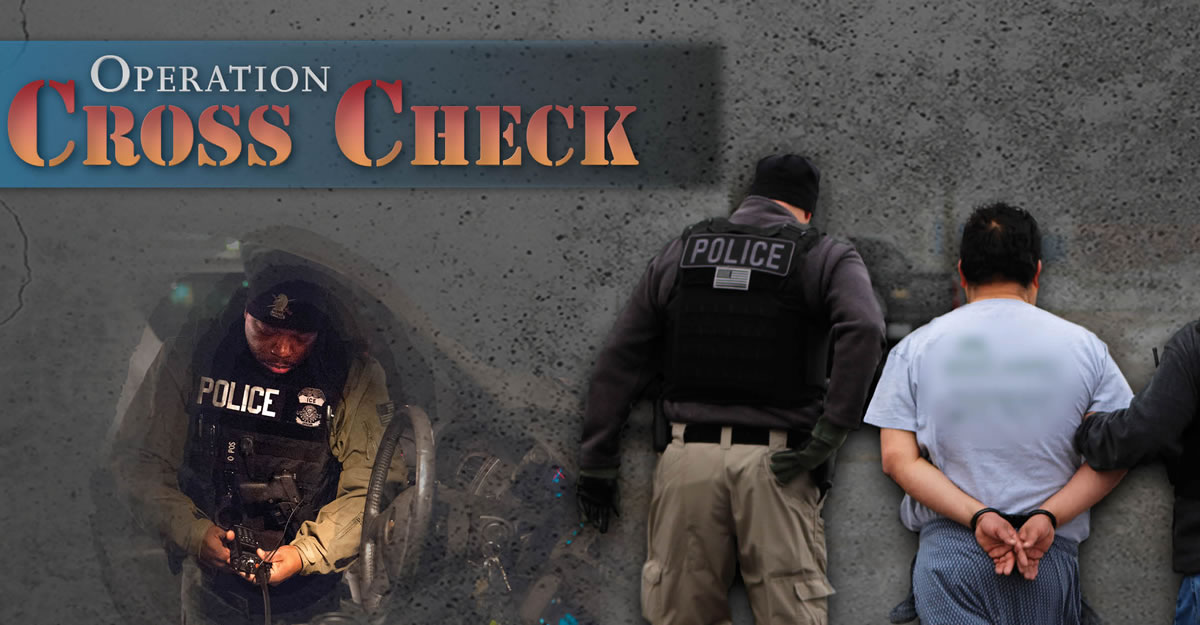Archived Content
In an effort to keep ICE.gov current, the archive contains content from a previous administration or is otherwise outdated. This information is archived and not reflective of current practice.
2,059 convicted criminals arrested in ICE nationwide operation
WASHINGTON — A five-day nationwide operation targeting convicted criminal aliens subject to removal from the United States yielded the arrest of 2,059 convicted criminals. The operation was led by U.S. Immigration and Customs Enforcement’s (ICE) Enforcement and Removal Operations (ERO).
“This nationwide operation led to the apprehension of more than 2,000 convicted criminal aliens who pose the greatest risk to our public safety,” said Deputy Secretary of Homeland Security Alejandro Mayorkas. “Today, communities around the country are safer because of the great work of the men and women of U.S. Immigration and Customs Enforcement.”
The operation, dubbed “Cross Check,” began Sunday, March 1, and ended Thursday, March 5. Hundreds of ERO officers participated in the operation that focused on the arrests of public safety threats. Those arrested are from 94 countries and have a wide array of criminal convictions.
The 2,059 individuals with prior criminal convictions who were arrested included more than 1,000 individuals who had multiple criminal convictions. More than 1,000 of those arrested had felony convictions, including voluntary manslaughter, child pornography, robbery, kidnapping and rape.
Of the total 2,059 criminals arrested, 58 were known gang members or affiliates, and 89 were convicted sex offenders.
The vast majority of misdemeanor convictions were for driving under the influence of alcohol or drugs (DUI). ICE considers DUI offenders, particularly repeat offenders, to be a significant public safety threat.
In addition to being convicted criminals, five of those arrested were also immigration fugitives who had previously been ordered to leave the country but failed to depart. Also, 476 were illegal re-entrants who had been previously removed from the country. Because of their serious criminal histories and prior immigration arrest records, 163 of those arrested during the enforcement action were presented to U.S. attorneys for prosecution on a variety of charges, including illegal re-entry after deportation, a felony punishable by up to 20 years in prison.
Arrests include:
- A Jamaican citizen arrested in Atlanta, Georgia, who was convicted in 2014 of breaking and entering, larceny, speeding to elude arrest and assault with a deadly weapon on a law enforcement officer.
- A Polish citizen arrested in East Hartford, Connecticut, who was convicted twice for possession of cocaine and other drugs, twice for probation violation and resisting arrest and once for reckless driving.
- A Finnish citizen arrested in Naperville, Illinois, who was convicted in 2014 of child pornography involving a victim under 13-years-old.
- A Mexican citizen arrested in Arvada, Colorado, who is a documented member of the Sureños criminal street gang and was convicted in 2014 of possession of a weapon.
Two targets of this operation who were not apprehended were added to ICE’s most wanted fugitives list.
“This national operation exemplifies ICE’s ongoing commitment to prioritizing convicted criminals and public safety threats for apprehension and removal,” said ICE Director Sarah R. Saldaña. “By taking these individuals off our streets and removing them from the country, we are making our communities safer for everyone.”
All targets of this operation fell within the top two priorities established in Secretary of Homeland Security Jeh Johnson’s Nov. 20 memorandum titled "Policies for the Apprehension, Detention and Removal of Undocumented Immigrants.” Priority 1 targets include threats to national security, criminal street gang members, convicted felons, and aggravated felons. Priority 2 targets have convictions for three or more misdemeanors or convictions for significant misdemeanors, including DUIs.
The foreign nationals detained during the operation who are not being criminally prosecuted will be processed administratively for removal from the United States. Those who have outstanding orders of deportation, or who returned to the United States illegally after being deported, are subject to immediate removal from the country. The remaining individuals are in ICE custody awaiting a hearing before an immigration judge, or pending travel arrangements for removal in the near future.
Secretary Johnson has directed ICE to prioritize the use of enforcement personnel, detention space, and removal assets to support the department’s civil immigration enforcement priorities. By taking criminals who pose public safety threats off community streets and removing them from the country, ICE addresses a significant security and public safety vulnerability.
ICE began conducting large-scale national operations targeting convicted and other ERO priority aliens in May 2011. Since then, five national Cross Check operations resulted in the arrest of more than 12,440 convicted criminals as well as 774 other priority individuals for a total of 13,214 arrests.
This operation is the sixth nationwide Cross Check operation in the agency’s history. The first nationwide Cross Check operation occurred at the end of May 2011 and resulted in the arrest of 2,442 convicted criminals. The last Cross Check operation in August 2013 resulted in the arrest of 1,517 convicted criminals, as well as 143 other priority individuals for a total of 1,660 arrests.
This week’s enforcement action was spearheaded by ICE’s National Fugitive Operations Program, which locates, arrests and removes at-large criminals. The officers who conducted this operation received substantial assistance from ICE’s Fugitive Operations Support Center and ICE’s Law Enforcement Support Center, both located in Williston, Vermont.
In fiscal year 2014, ERO removed 315,943 individuals from the United States. ICE enforcement priorities include removable aliens considered threats to national security, those attempting to unlawfully enter the U.S., gang members, felons, and individuals convicted of crimes including domestic violence, sexual abuse, drug distribution or driving under the influence.


